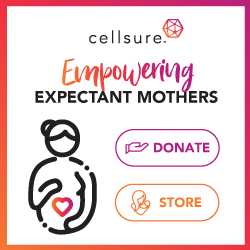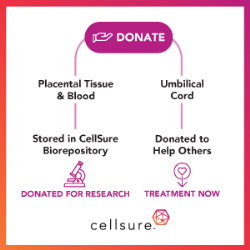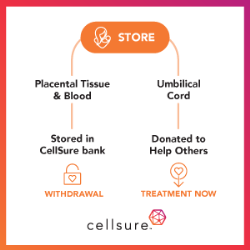You are here
Cellsure Brings Disruptive Innovation to the Banking of Stem Cells
 A disruptive innovation is one that improves a product or service in ways that the market does not expect, typically by lowering prices or being designed for a different set of consumers. For example, drugs that lower cholesterol are disruptive to angioplasty, just as previously angioplasty was disruptive to open heart surgery. Disruptive innovations are the key to ushering in more efficient and affordable health care options.
A disruptive innovation is one that improves a product or service in ways that the market does not expect, typically by lowering prices or being designed for a different set of consumers. For example, drugs that lower cholesterol are disruptive to angioplasty, just as previously angioplasty was disruptive to open heart surgery. Disruptive innovations are the key to ushering in more efficient and affordable health care options.
A new stem cell storage company that may prove to be disruptive is Cellsure. Founded by physicians, Cellsure is a low-profit limited liability company (L3C) based in Salt Lake City, Utah, that banks stem cells from the birth tissues of the placenta and the umbilical cord. Parents that bank with Cellsure are offered a choice between donation of their birth tissues at no cost, or family storage of their birth tissue stem cells.
Cellsure is disruptive to the paradigm of the cord blood industry because Cellsure does not separately collect and store blood from the umbilical cord. Instead, Cellsure relies on the fact that a large proportion of the baby's blood remains in the placenta after birth. By processing the fetal side of the placenta to release stem cells, Cellsure offers parents storage of the same stem cells that are in cord blood, as well as stem cells that are found in the placental tissue.
Cellsure's method of mechanically processing the placenta releases mesenchymal stem cells like those in cord tissue, hematopoietic stem cells from blood, endothelial stem cells from the lining of blood vessels, and epithelial stem cells from the amniotic membrane. Cellsure cryopreserves a large concentration of all of these stem cells together in one final 25 cc storage bag with 5 compartments.
 Not only does Cellsure offer parents a radically different option for storage of their newborn stem cells, but Cellsure also disrupts the industry by offering family storage with a first-year fee that is lower than the initial fees of many family cord blood banks. Cellsure’s low prices make newborn stem cell banking affordable to a whole new demographic of parents who may have previously felt that cord blood banking was beyond their budget.
Not only does Cellsure offer parents a radically different option for storage of their newborn stem cells, but Cellsure also disrupts the industry by offering family storage with a first-year fee that is lower than the initial fees of many family cord blood banks. Cellsure’s low prices make newborn stem cell banking affordable to a whole new demographic of parents who may have previously felt that cord blood banking was beyond their budget.
Cellsure fully integrates their public and private banking services. Every mother that participates in the Cellsure program is a donor. This donation is the reason the company is able to drastically reduce storage fees. Parents can choose between donating their placenta and umbilical cord at no cost, or those families that choose to privately bank their placenta stem cells will still donate their umbilical cord. Therefore, all participants must go through a complete health history screening and informed consent process.
Cellsure believes that their service of collecting and storing multiple types of native stem cells in one process is ultimately more powerful than storage of cord blood alone. The stem cells are isolated from the tissues and tested for viability before cryopreservation. Each cell type can be expanded by researchers for future therapies or used together. For example, some bone marrow transplant researchers believe that cord blood stem cells should be cultured in the presence of mesenchymal stem cells, to mimic the natural environment of bone marrow.
Healthcare providers are attracted to the Cellsure paradigm for storage of newborn stem cells. Simply placing the placenta and umbilical cord into the collection kit is easier than collecting blood from the umbilical cord. The collection procedure is compatible with delayed cord clamping, no matter how long a delay the parents request. The procedure is the same regardless of whether the collection is for public or private use. Hospitals like the idea of partnering with a company that can provide both storage and donation options and a program that combines a public health service with personal banking.
 This month, July 2019, Cellsure is launching their services nationally. They have been operating at select hospitals in Utah for the past two years. Now, Cellsure will accept mail-in donations of birth tissue as well as shipments for personal storage from across the United States. The Cellsure kit for collection and shipping contains an active cooling system, not just insulation. Once the kit is packed and the cooling system is triggered, it will keep the contents cooled to the appropriate shipping temperature for 48 hours.
This month, July 2019, Cellsure is launching their services nationally. They have been operating at select hospitals in Utah for the past two years. Now, Cellsure will accept mail-in donations of birth tissue as well as shipments for personal storage from across the United States. The Cellsure kit for collection and shipping contains an active cooling system, not just insulation. Once the kit is packed and the cooling system is triggered, it will keep the contents cooled to the appropriate shipping temperature for 48 hours.
Cellsure is unique. At present, there is no other company worldwide that offers whole placenta processing as an alternative to cord blood banking. In fact, there is only one other company in the United States that actually processes the placenta to release cells, but their service is relatively expensive. No other company has a pricing plan like Cellsure. Today, Cellsure is the ONLY company in the United States that has fully integrated personal and public banking of newborn stem cells.
Parent’s Guide to Cord Blood Foundation anticipates that Cellsure may cause disruption to the industry of cord blood banking. Traditional cord blood banks may need to adjust their messaging to explain why they advise parents to collect cord blood as a standalone service. Some companies will try to imitate Cellsure and some companies may falsely advertise that they have the same service. But, hopefully the disruption created by Cellsure will drive the market to provide new and innovative storage options as well.


